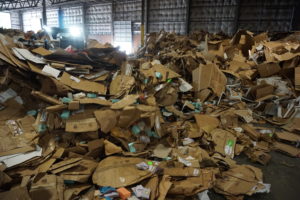Although most Americans probably didn’t realize it, last month marked the beginning of a new era in the recycling industry.
China’s “National Sword” policy, which was announced last year but went into effect on January 1st, has caused a ripple effect that’s already changing the way U.S. recyclers operate. The policy was enacted to put an end to the practice of shipping contaminated materials to China, which buys 55% of the world’s scrap paper and a significant share of other recyclables.
For decades, Chinese inspectors would accept whatever recyclables American companies saw fit to send them, which meant they ended up taking ownership of garbage and dangerous materials that were mixed in with the usable stuff. The country’s lax restrictions proved profitable for recyclers and resulted in a rise in single-stream programs. By telling Americans that they could throw all their recyclables into the same containers – and then loading all those mixed materials onto the same trucks – recycling programs were able to increase the amount of product that they collected. It worked because China would willingly pay for all that material.
But, China got sick of taking possession of unusable product and introduced Operation Green Fence a few years ago as a message that it would be enforcing new inspection restrictions on imported recyclables. National Sword marks the next step in these efforts for the country. China has vowed to stop buying 24 types of plastic and paper recyclables with a policy that went into effect on January 1st. Shipments of materials that aren’t banned will only be accepted by China’s inspectors if they contain less than 0.5% contaminated product in plastic bales, 1% in ferrous and nonferrous metals and 1.5% in scrap paper, standards that many recyclers say is impossible to meet.
So what effect will National Sword have on American recyclers? For one thing, many of the large single-stream operations will be forced to change their practices, slowing down their conveyor belts and using additional labor in order to remove more of the contaminants (like trash and items that are dirty, greasy or contain hazardous chemicals) from the stream. We may even see single-stream operations be modified to eliminate glass or plastics. That could require recycling programs around the country to reeducate Americans about what they can and can’t toss into their bins.
Industry insiders aren’t entirely sure what the long-term effects of National Sword will be, or whether China will maintain its inspection policies or amend them at some point. In the meantime, some recyclers find themselves stuck with great quantities of materials that they can no longer sell to China, some of which will end up in landfills.
As the industry continues to evolve and adjust to this new reality, Miller Recycling will be watching closely. Check out our President Randy Miller’s thoughts on China’s recycling policy for American Metal Market, as well as our article on the long term impact of the ban.

